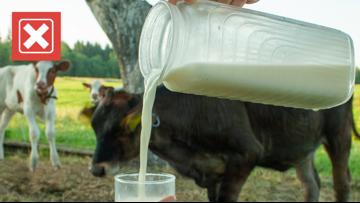Urinary tract infections (UTIs) happen when bacteria infect the urinary tract, including the bladder and the kidneys.
Around 8-10 million people are treated for UTIs annually. Though the most common UTI treatment is antibiotics, some people recommend drinking cranberry juice.
VERIFY reader Nguri reached out to ask if drinking cranberry juice can actually help treat a UTI.
THE QUESTION
Is cranberry juice an effective treatment for a urinary tract infection?
THE SOURCES
- Leslie Rickey, M.D.
- A Cleveland Clinic article
- Piedmont Healthcare
- A review published in Clinics
- A review published in The Journal of Nutrition
- A study published in the Journal of Medicinal Food
- A Houston Methodist article
- Mount Sinai
- A Denver Urology article
- An article published by Healthwise
- Mayo Clinic
- The Food and Drug Administration
- The American Urological Association
THE ANSWER
There is no evidence cranberry juice is an effective treatment for an active urinary tract infection. However, drinking cranberry juice could help prevent UTIs from occurring.
WHAT WE FOUND
There’s no evidence cranberry juice or supplements can treat an active UTI. Antibiotics are the primary recommended treatment for UTIs.
However, studies have shown that drinking cranberry juice or taking cranberry supplements may help prevent urinary tract infections for people who have recurrent UTIs.
An article published on Houston Methodist’s website says “No studies have shown that drinking cranberry juice or taking a cranberry supplement actually works to treat UTIs.”
An article written by Healthwise and published on Kaiser Permanente’s website says the same thing, noting that cranberry has not been “well tested as a UTI treatment.” A Denver Urology article explains that cranberry won’t cure a UTI because “it will not kill the bacteria” that causes the infection.
The idea that cranberries can treat a UTI may stem from studies that have shown cranberry can prevent UTIs from developing in some people. Piedmont Healthcare and a Houston Methodist article explain that proanthocyanidins, a substance found in cranberries, may keep the bacteria that causes UTIs from sticking to bladder walls in the first place and causing an infection.
But this does not help to treat an active UTI because the substance is less effective once the bacteria has already attached, Mount Sinai explains.
A review published in Clinics notes multiple studies have shown that this substance present in cranberries inhibits UTI-causing bacteria from adhering to bladder walls. One of these peer-reviewed studies, published by the Journal of Medicinal Food in 2011, noted that drinking cranberry juice could decrease the adhesion of E.coli, a type of bacteria that can infect the urinary tract, for up to eight hours after consumption.
A 2017 review published in The Journal of Nutrition also noted studies of 1,498 women found cranberry products reduced UTI recurrence by 26%.
Both the FDA and the American Urological Association mention cranberry products as a potential way to prevent UTIs.
The FDA says “Consuming one serving (8 oz) each day of a cranberry juice beverage may help reduce the risk of recurrent urinary tract infection (UTI),” but notes that scientific evidence is limited and inconsistent. The American Urological Association says clinicians may offer cranberry prophylaxis for people with recurrent UTIs.
The results of drinking cranberry juice to prevent a UTI can be mixed. Piedmont Healthcare’s website says “clinical studies have not yet demonstrated the efficacy of cranberry juice in preventing or curing UTIs in women who don’t suffer from recurrent infections.”
The Houston Methodist article also notes that some studies show cranberry juice provides a “small benefit” in preventing UTIs, “while most show none at all.”
A Cleveland Clinic article also points out that cranberry “products may not have enough of the active ingredient to be effective in preventing bacteria from sticking to the bladder wall.” Despite this, Courtenay Moore, M.D., said in the article that drinking cranberry juice “could be worth trying if you struggle with frequent UTIs, as the risk in doing so is very low.”
If people do try drinking cranberry juice, they should make sure it isn’t too sugary, medical experts say.
“I usually advise patients [with recurrent UTIs] to pick cranberry juice with as little additives, like sugar, as possible,” Tia Guster, M.D., explained in the Piedmont Healthcare post. “Either the actual…concentrated cranberry juice, which doesn’t taste very good, or supplements like in the form of tablets or something, that’s where most of the research has been shown that it can be effective,” says Leslie Rickey, M.D.
If you have an active UTI, Rickey says to “increase your fluids to try to help flush it out” or take ibuprofen to relieve pain and irritation. But, if your symptoms don’t improve, you should “call your doctor, check a urine specimen [and] get antibiotics if you need” them, Rickey says.
The Mayo Clinic adds that antibiotics are typically the main treatment for UTIs, and “your health and the type of bacteria found in your urine determine which medicine is used and how long you need to take it.” It is recommended that you talk to a healthcare professional for more guidance.
This story is also available in Spanish / Lee este artículo también en español: No hay evidencia de que el jugo de arándano pueda curar una infección urinaria, pero sí podría prevenirla












